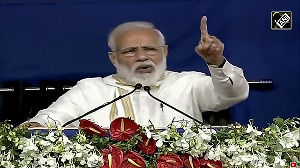
Is it risky to lend to an Non-Resident Indian who lives in a distant land? Indian banks certainly don't think so.
They offer home loans quite freely to NRIs -- but they do insist on a lot more paperwork before parting with cash.
NRIs can -- much like residents who live in India -- take loans at any stage before striking a deal. They can buy houses that are under construction or for sale. They can also take a loan to buy a plot of land or to renovate/improve an existing property.
Firstly, it's important to determine who -- according to the banks -- is an NRI.
The banks follow the RBI guidelines, "An Indian citizen who holds a valid Indian passport and who stays abroad for employment or for carrying on business or vocation outside India or stays abroad under circumstances indicating an intention for an uncertain duration of stay abroad is a NRI."
Some banks such as the State Bank of India also offer loans to Persons of Indian Origin holding a foreign passport.
Interest rates for NRI loans aren't very different from charges for Indians living in this country. But the loan is for a much shorter period.
For instance, an NRI taking a loan from HDFC bank must repay it in a maximum of seven years. On the other hand, the SBI gives loans that have to be repaid in 10 years to 12 years.
Banks usually offer home loans for up to 15 years to 20 years, to people who live in this country.
Also, Indians living in this country can take loans for up to 90 per cent of the cost of the property. By comparison NRIs are offered loans for only up to 85 per cent of the property's cost.
The one exception is ICICI Bank which has tied up with several builders in Mumbai, Delhi and NCR and provides 100 per cent finance if you purchase property from any one of them (in some cases the loans are given only for specific projects which the builders are involved in).
These builders include Nirmal Lifestyle, Raheja Corp, Vijay Group, Evershine Builders, Hirandani Constructions and Neelkanth Group in Mumbai.
In Gurgaon and Noida, the loans are available for DLF-Trinity, Carlton, Unitech-Uniworld, Omaxe-Royal Residency, Aashiana-Orchid, etc.
The size of the loan depends upon the borrower's repayment capacity. However, there is a maximum limit.
For instance, HDFC offers loans for up to Rs 1 crore (Rs 10 million), while SBI offers a maximum loan of up to 24 times the borrower's net monthly income.
The eligibility of an NRI is calculated in the same way as it is calculated for a resident Indian.
However, banks have to take greater care because NRIs live further away in regions where the banks may not have an understanding of the situation on the ground.
Therefore, for NRIs more emphasis is laid on their qualifications, current job profile, probability of continuing abroad for the loan tenure and the probability of servicing the loan with an extended tenure in case the NRI has to return to India.
As a result, a large number of documents must be submitted for a loan. These include a copy of the person's passport and the visa, a copy of the appointment letter and contract.
Also, there must be a copy of the labour card/identity card (translated in English and countersigned by the consulate) if the person is employed in the Middle East, and a salary certificate (in English) specifying name, date of joining, designation and salary details.
Besides that, there must be bank statements for the last six months -- both domestic (NRE/NRO/FCNR) and international.
A borrower must also submit a general power of attorney attested by the Indian consulate at the place of residence if they are not available in India at the time of submitting the application form. In case you are in India, the power of attorney can be locally notarised.
The NRI's contribution towards the house has to be paid upfront.
Such payments have to be made by way of direct remittances from abroad through normal banking channels or from such accounts specified by the Reserve Bank of India.
Nowadays, the payments can be made through Non-Resident Ordinary (NRO) account or the Non-Resident External (NRE) account.
Once the loan comes through, it must be repaid as equated monthly instalments which too can either be remitted to the bank from abroad through regular banking channels or can be repaid through the NRE account or the NRO account in India.
For security most banks insist that the first mortgage of the property should be in their name. If the property is under construction then adequate additional security is required such as guarantee of third party (either resident or non-resident).
The loan fees vary from bank to bank. For instance, HDFC charges 1.25 per cent of the loan and SBI charges 1 per cent.
NRI's can't claim tax benefits on home loans. However, if they pay tax in India for income earned in India, they can claim tax rebate for the home loan.






 © 2025
© 2025